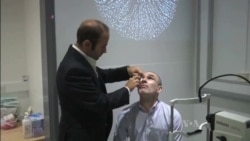Parkinson's disease is usually discovered too late in patients for effective treatment. But now there's a new eye test that could diagnose the devastating condition much earlier. The degenerative condition causes muscle stiffness, slowness of movement, and tremors. Although there is no cure for Parkinson’s, if the disease can be caught at its beginning stages, medications and other therapy could help control the symptoms.
The new eye test may be a breakthrough for spotting Parkinson’s disease early. Most people may not know they have it for many years because the disease is gradual, causing nerve cell damage in the brain that affects the central nervous system.
And right now, there is no one test or brain scan that can diagnose the condition.
Using a new imaging technique, the new eye test looks for changes in people’s retinas. It was developed by researchers at the University College London Institute of Ophthalmology.
First, scientists injected rats with a chemical that causes Parkinson’s. Once they saw the changes in the retina, they treated the rats with an anti-diabetic drug, that helps protect nerve cells, and which, according to ophthalmologist Dr. Eduardo Normando, could potentially be used to treat the disease.
“By injecting the Rosiglitazone in these rats we were able to see a rescue effect of Rosiglitazone in this model, first in the eye and then in the brain,” said Normando.
It’s not known why people get Parkinson’s, which is estimated to affect one in every 500 people like the late boxer Muhammad Ali. Testing for Parkinson’s in the retina first could have far-reaching implications, said Dr. Francesa Cordeiro, an ophthalmologist.
“It could predict that, that person needs a second tier of investigations which will decide whether they have Parkinson’s or not, and then you could carry on using this test to monitor, not only how fast they are progressing, but actually, if they are on the correct treatment and that’s huge,” said Cordeiro.
Human trials for the Parkinson’s eye test are to begin soon.
“If you've seen the effects in the retina well before you see those effects in the brain, then actually you could shorten the length of clinical trials, and you could use this as a very good marker of treatment success. But in the long run, what we think is that it could be a way of trying to see if patients are ever going to get Parkinson's disease," said Cordeiro.
And that could lead to better treatment for the debilitating disease in the future -- with testing possibly being done during a regular eye check-up.





